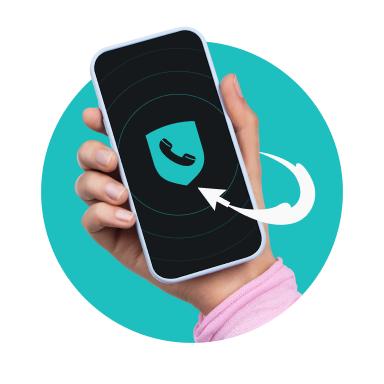Music fans may know Jenny’s number is 867-5309, but that doesn’t mean we all want our digits exposed.
That said, sensitive personal information is a prime target for scammers today, and hackers can do a lot of damage with just your phone number. That’s why keeping yours private has never been more important.
Let this guide walk you through how scammers can access your number, what you should do if a scammer has yours, and what preventative steps you can take to stay safe.
How do scammers get your phone number?
Scammers can use various tactics to steal your number. Knowing what to watch out for can give you the upper hand in protecting your bank account, biometric data, and more.
Here are the most common methods:
Data breaches
A data breach occurs when unauthorized individuals gain access to confidential databases containing phone numbers, email addresses, and other personal details. These breaches can happen anywhere you’ve entered your private data, including banking sites and social media accounts.
Social engineering
Social engineering involves tricking people into divulging personal details using deceptive tactics. For example, scammers may pretend to be a trusted entity, like a government agency, to get you to share your personally identifiable information.
A common type of social engineering is phishing emails, where a scammer sends a fake email that looks real. These messages ask for personal information, like the victim’s financial data or telephone number.
Stolen mail
Physical mail theft is a low-tech method cybercriminals use to get phone numbers. Important documents containing your cell phone number, such as bank statements and utility bills, can be manually intercepted and exploited by dumpster divers digging through your trash.
What can scammers do with your phone number?
Once scammers have your phone number, they can use it for a variety of harmful activities, including putting your number on the dark web. Most actions boil down to the victim losing money. In 2023, scams cost people $10 billion, with phone call scams causing the highest losses per person.
Understanding what hackers can do with your number is an essential first step in safeguarding your information — and your wallet.
Identity theft
Cell phone fraudsters can pose as you and contact your bank, mobile service provider, and other institutions, causing financial and personal harm. By stealing a victim’s identity, scammers can make monetary transactions, access personal information, and open new accounts in the victim’s name. They can even request password resets, blocking you from accessing your own information.
Telephone scams
Scammers may contact you directly via telephone to steal more personal information or trick you into sending funds over mobile services like Cash App. They might call you, pretending to be a trusted source like a bank or mobile carrier, to pressure you into revealing more details. They may also send fake text messages, known as smishing, to trick you into clicking malicious links.
Unauthorized access to accounts
In a SIM swapping attack, a criminal can trick your phone carrier into transferring your number to a new SIM card that they possess. Once the swap is complete, scammers control your number and receive calls and texts intended for you. In addition, they can use your number to intercept two-factor authentication (2FA) codes. Anytime banks or other services send a 2FA code via text to verify your identity, criminals will be able to reset passwords or gain access to your private accounts.
Port-out scams
Port-out scams involve hackers transferring your phone number to a different mobile carrier without your consent using stolen personal details. They’ll gain control of your number and will be able to use it as if it were their own. Even worse, you’ll lose access to your number and won’t be able to use your phone to communicate with others or access accounts that rely on your number for security verification.
What to do if a scammer has your phone number
If you suspect that a scammer has your phone number, don’t panic. These steps can go a long way in protecting you:
1. Contact your mobile carrier
Let your mobile carrier know immediately about the situation. They can place a fraud alert on your account and monitor for any suspicious activity. Sometimes, they might even issue you a new number and help you restore your contacts and back up your call or messaging history.
2. Inform your contacts
If someone steals your phone number, tell those closest to you as soon as possible. You might not be a scammer’s only victim, so keep your contacts in the loop. They’ll be aware of their risks and know to be cautious of suspicious calls or text messages from your number.
Advise contacts not to share sensitive information or click on any links they may receive from your number. These preventative steps can protect your friends, family, and entire network from potential fraud.
3. Lock your SIM card
Ask your mobile carrier to lock your SIM card, securing it with a PIN to prevent unauthorized transfers or use. This will also help foil anyone attempting a SIM swap scam.
You can also request a new SIM card with the same phone number to recover your data. That way, you’ll be able to access anything that’s backed up to a cloud service or stored on your device.
4. Don’t answer phone calls from unknown numbers
Don’t pick up if you receive a call from an unknown or unfamiliar number. If a criminal can’t reach their victim, there’s a good chance their phone scam won’t get very far.
In addition, don’t return any missed calls from new numbers — especially if your phone rings once and then disconnects. These are known as one-ring phone scams and are designed to lure you into calling back a number that charges exorbitant fees.
5. Never click on links from unknown senders
Avoid clicking on links in text messages from people you don’t know. These links might lead to phishing websites or download malware onto your mobile device.
Sending links via text message isn’t all that common, so even if a link comes from someone you know, contact this person directly through another channel to confirm the message’s authenticity.
6. Block scam calls on your phone
You can use your mobile phone’s built-in features or third-party apps to block scam calls and reduce unwanted interruptions.
Most smartphones let you block individual numbers from your call settings, but you can also look into call-blocking apps that go a step further. These automatically detect and block known scam numbers, filter out robocalls, and offer advanced reporting features.
7. Monitor your financial accounts
Check your bank accounts and credit card statements regularly for unapproved transactions. This step is crucial for promptly detecting and addressing any suspicious activity after having your phone number stolen.
Review bank statements or credit card transactions for anything that looks unusual. If you notice anything out of place, report it to your financial institution and block your account immediately.
8. Replace your passwords
A scammer can only go so far if all they have is your phone number and not any other personal data. To mitigate any damage done, replace your passwords for all of your sensitive accounts, including email, banking, and social media.
Use strong, unique passwords for each account containing letters, numbers, and special characters. Avoid using the same password across multiple sites to minimize the risk of a breach affecting several accounts. In addition to this, enable 2FA wherever possible to add an extra layer of security.
9. Monitor your credit reports
Staying on top of your credit reports can help detect identity theft early, and in many countries, it’s free. For example, US residents can get a free credit report each year from each of the three major credit bureaus: Experian, Equifax, and TransUnion.
Check your reports for inconsistencies and notify the appropriate credit bureau of any issues. Taking these steps protects your credit score and minimizes the impact of a stolen phone number on your financial health.
10. File a police report
If you fear a scammer has already committed a crime with your phone number, consider visiting your local precinct. A police report creates an official record of whatever transpired and might prove useful if you’re trying to dispute fraudulent charges or clear your name of wrongful activities tied to your stolen number.
When filing your report, provide all relevant details, including when you discovered the theft, what you suspect the scammer already did with your number, and what steps you’ve already taken. Keep a copy of this official report for your records, as you may need it when dealing with credit bureaus, financial institutions, or other entities.
How to protect yourself against scammers
You don’t need to wait for a scammer to nab your number to stay safe. Stick to these preventative measures to proactively keep your phone number secure.
1. Use an alternative number
A secondary phone number can be a valuable resource for all kinds of non-essential services and online forms. With tools like Surfshark’s alternative number, you can protect your primary number from being exposed to scammers.
How?
With an alternative number, you’ll generate a virtual number for all your online accounts and listings. This will help shield your regular number from smishing, identity theft, and prying eyes.
2. Secure your online accounts with strong passwords and 2FA
Robust passwords aren’t just handy if your number is stolen — they’re also potential life-savers when preventing theft outright. Change your passwords every three months or so to make it more difficult for scammers to crack your accounts in the first place.
Moreover, adding 2FA — like text message codes, email links, or a fingerprint scan — to your passwords takes your security up another level. Even if a scammer manages to get your password, they won’t access your data without the second factor. Keeping your accounts secure will reduce the chances of scammers finding your number and other sensitive information.
3. Remove your phone number from data broker lists
As an extra precaution, it’s a good idea to check if your number is on any data broker lists and request that it be removed. Data brokers collect and sell personal information — including phone numbers — to companies for marketing purposes, and these private details can easily fall into the hands of scammers.
Many of the largest data brokers let you opt out of their marketing lists, so you have to contact them directly. Request to have your number removed and you’ll minimize the odds of scammers ever getting access to it.
Pro tip: Solutions like Incogni are an excellent way to prevent scam attacks. Incogni automatically opts you out of these broker databases, giving you more control over your data. Incogni is included in the Surfshark One+ plan.
4. Shred old documents
Bills, bank statements, and medical records usually include your phone number, and unfortunately, simply throwing them into the trash makes them a goldmine for criminals.
Shred these documents to ensure no one can stumble upon your personal information in the garbage. This act may seem simple, but it can dramatically reduce the risk of scammers getting hold of your number and other data.
Keep your number secure
Having a scammer gain access to your phone number can be stressful, but staying vigilant and responding quickly can help you stay safe.
Use the tips outlined in this guide to defend yourself from scammers and keep your mobile devices secure.
FAQ
Can a scammer do anything with my phone number?
Scammers can use your number to commit identity theft, carry out telephone scams, and gain unauthorized access to your accounts.
What if I accidentally gave my phone number to a scammer?
If you accidentally gave your phone number to a scammer, inform your mobile service provider to secure your account, monitor for suspicious activity, and consider changing your linked passwords. Also, stay alert for unwanted contact attempts, since even replying to a suspicious message can create vulnerabilities.
Can you stop someone from using your phone number?
To stop scammers from using your phone number, secure your online accounts with strong passwords and 2FA, remove your number from data broker lists, and shred documents containing personal information. Better yet, use a tool like Surfshark’s Alternative Number to set up a virtual number for your online accounts.
Should I be worried if a scammer has my phone number?
Yes, you should be cautious if a scammer has your phone number. They could use it to steal sensitive data, ask you to send money, and gain access to your online accounts. Monitor your accounts for suspicious activity and take steps to enhance your security.
What do I do if a hacker has my phone number?
If a scammer has your phone number, contact your mobile carrier and lock your SIM card. Ignore suspicious calls, never click on links in text messages from unknown numbers, and monitor your important financial accounts for unusual activity.
How do scammers get my phone number?
Scammers obtain your information in many ways. For example, they can get your phone number through data breaches, social engineering, online scams, and stolen mail.





